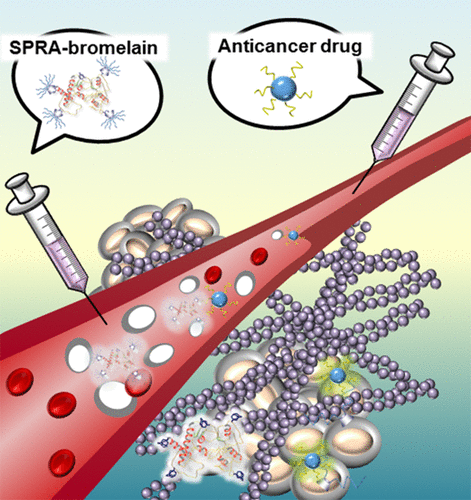当前位置:
X-MOL 学术
›
ACS Appl. Bio Mater.
›
论文详情
Our official English website, www.x-mol.net, welcomes your
feedback! (Note: you will need to create a separate account there.)
Efficient Anticancer Drug Delivery for Pancreatic Cancer Treatment Utilizing Supramolecular Polyethylene-Glycosylated Bromelain
ACS Applied Bio Materials ( IF 4.6 ) Pub Date : 2020-04-01 , DOI: 10.1021/acsabm.0c00070 Taishi Higashi 1, 2 , Tetsuya Kogo 2 , Nana Sato 2 , Tatsunori Hirotsu 2 , Shogo Misumi 2 , Hideaki Nakamura 3 , Daisuke Iohara 3 , Risako Onodera 2 , Keiichi Motoyama 2 , Hidetoshi Arima 4
ACS Applied Bio Materials ( IF 4.6 ) Pub Date : 2020-04-01 , DOI: 10.1021/acsabm.0c00070 Taishi Higashi 1, 2 , Tetsuya Kogo 2 , Nana Sato 2 , Tatsunori Hirotsu 2 , Shogo Misumi 2 , Hideaki Nakamura 3 , Daisuke Iohara 3 , Risako Onodera 2 , Keiichi Motoyama 2 , Hidetoshi Arima 4
Affiliation

|
Pancreatic cancer is one of the most difficult cancers to treat largely because of the inability of anticancer drugs to penetrate into the cancer tissue as the result of the dense extracellular matrix (ECM). On the other hand, bromelain is known to degrade the ECM in cancerous tissue. However, the half-life of bromelain in blood is short, leading to its low accumulation in tissues. Recently, we developed a reversible poly(ethylene glycol) (PEG) modification technology that is able to improve blood retention of proteins without loss of activity and termed it “Self-assembly PEGylation Retaining Activity (SPRA)” technology. Here, we prepared reversible PEGylated bromelain using SPRA technology (SPRA-bromelain) possessing high activity, long blood retention, and high tumor accumulation and evaluated its potential as a drug delivery system for pancreatic cancer. SPRA-bromelain was prepared by mixing adamantane-modified bromelain and multisubstituted-PEGylated β-cyclodextrins (β-CyDs) containing 2 or 20 kDa PEG chains in water. SPRA-bromelain was formed by a host–guest interaction between adamantane and β-CyD (Kc > 104 M–1). SPRA-bromelain showed high in vitro gelatin-degrading activity and enhanced not only the accumulation of fluorescein isothiocyanate (FITC)-dextran (2 MDa) in the tumor but also the in vivo antitumor activities of doxorubicin and doxorubicin encapsulated in PEGylated liposomes (DOXIL) after intravenous administration in tumor-bearing mice. These findings suggest that SPRA-bromelain could be a powerful tool for drug delivery in pancreatic cancer.
中文翻译:

利用超分子聚乙烯糖基化菠萝蛋白酶进行胰腺癌治疗的高效抗癌药物递送
胰腺癌是最难治疗的癌症之一,主要是因为致密的细胞外基质 (ECM) 导致抗癌药物无法渗透到癌组织中。另一方面,已知菠萝蛋白酶会降解癌组织中的 ECM。然而,菠萝蛋白酶在血液中的半衰期很短,导致其在组织中的蓄积量很低。最近,我们开发了一种可逆的聚乙二醇(PEG)修饰技术,能够在不损失活性的情况下改善蛋白质的血液保留,并将其命名为“自组装聚乙二醇保留活性(SPRA)”技术。在这里,我们使用SPRA技术制备了可逆的聚乙二醇化菠萝蛋白酶(SPRA-菠萝蛋白酶),具有高活性、长血潴留、和高肿瘤积累,并评估了其作为胰腺癌药物输送系统的潜力。SPRA-菠萝蛋白酶是通过在水中混合金刚烷改性菠萝蛋白酶和含有 2 或 20 kDa PEG 链的多取代聚乙二醇化 β-环糊精 (β-CyDs) 制备的。SPRA-菠萝蛋白酶由金刚烷和 β-CyD 之间的主客体相互作用形成(K c > 10 4 M –1 )。SPRA-菠萝蛋白酶在体外显示出高明胶降解活性,不仅增强异硫氰酸荧光素 (FITC)-葡聚糖 (2 MDa) 在肿瘤中的积累,而且增强了包裹在聚乙二醇化脂质体 (DOXIL) 中的阿霉素和阿霉素的体内抗肿瘤活性在荷瘤小鼠静脉内给药后。这些发现表明,SPRA-菠萝蛋白酶可能是胰腺癌药物递送的有力工具。
更新日期:2020-04-01
中文翻译:

利用超分子聚乙烯糖基化菠萝蛋白酶进行胰腺癌治疗的高效抗癌药物递送
胰腺癌是最难治疗的癌症之一,主要是因为致密的细胞外基质 (ECM) 导致抗癌药物无法渗透到癌组织中。另一方面,已知菠萝蛋白酶会降解癌组织中的 ECM。然而,菠萝蛋白酶在血液中的半衰期很短,导致其在组织中的蓄积量很低。最近,我们开发了一种可逆的聚乙二醇(PEG)修饰技术,能够在不损失活性的情况下改善蛋白质的血液保留,并将其命名为“自组装聚乙二醇保留活性(SPRA)”技术。在这里,我们使用SPRA技术制备了可逆的聚乙二醇化菠萝蛋白酶(SPRA-菠萝蛋白酶),具有高活性、长血潴留、和高肿瘤积累,并评估了其作为胰腺癌药物输送系统的潜力。SPRA-菠萝蛋白酶是通过在水中混合金刚烷改性菠萝蛋白酶和含有 2 或 20 kDa PEG 链的多取代聚乙二醇化 β-环糊精 (β-CyDs) 制备的。SPRA-菠萝蛋白酶由金刚烷和 β-CyD 之间的主客体相互作用形成(K c > 10 4 M –1 )。SPRA-菠萝蛋白酶在体外显示出高明胶降解活性,不仅增强异硫氰酸荧光素 (FITC)-葡聚糖 (2 MDa) 在肿瘤中的积累,而且增强了包裹在聚乙二醇化脂质体 (DOXIL) 中的阿霉素和阿霉素的体内抗肿瘤活性在荷瘤小鼠静脉内给药后。这些发现表明,SPRA-菠萝蛋白酶可能是胰腺癌药物递送的有力工具。











































 京公网安备 11010802027423号
京公网安备 11010802027423号